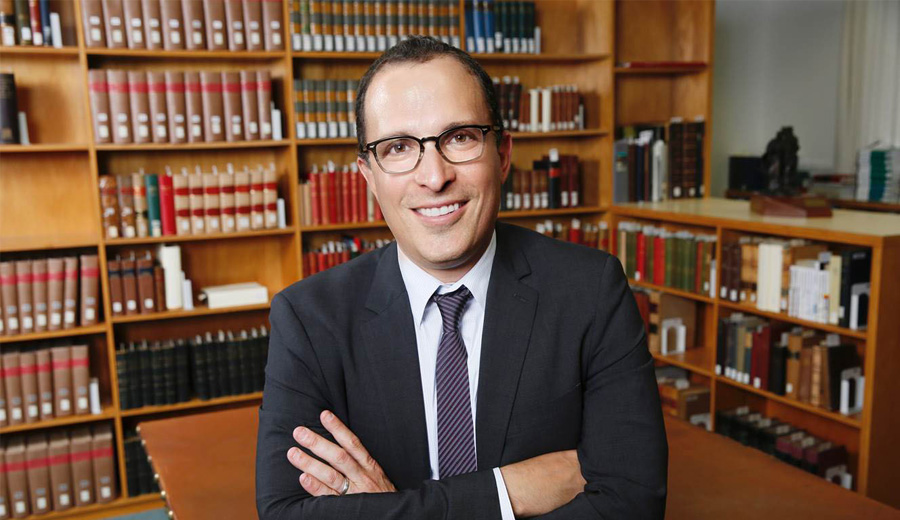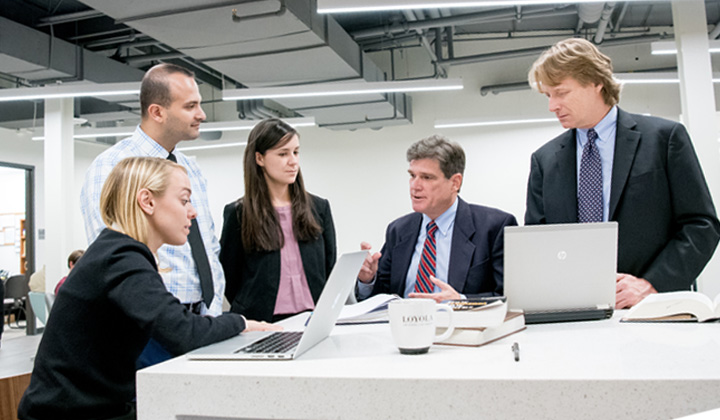A Message from Dean Michael Waterstone, LMU Loyola Law School

LMU Loyola Law School celebrated its 100-year anniversary in September 2020. Dean Michael Waterstone gives his View from the Top as he reflects on the school’s first century, the donors who helped get LMU Loyola Law School to where it is today, and his wish for the next 100 years.
As we reach 100 years at LMU Loyola Law School, I think we are at the most exciting crossroads and inflection point possible. And we have a crucial role to play. Not only does Los Angeles need LMU Loyola Law School to leap forward in the next century; our entire country and world need that, too.
In thinking about our impact, I always start with our graduates. We are producing not just lawyers, but those equipped to think like a lawyer, ready to make an impact in their chosen field from the beginning, who will truly have sustainable excellence over the course of their careers. Whatever challenges or opportunities that L.A. and the world face, the law is the fulcrum to create change.
The second way that we will continue to impact Los Angeles, and through Los Angeles the world, is with our social justice mission. We live in a world that for many people limits access to the justice system: It is one set of rules if you have resources and a completely different one if you don’t. It is also broken along racial lines. We have not just the opportunity, but also the obligation presented by our mission of filling that access-to-justice gap.
A particularly important and visible way we do this work is through our clinical programs. Clinical programs are where our students, under the supervision of our faculty, work on real cases involving real people with extraordinary unmet legal needs. Our students are getting people out of jail who were convicted of crimes they did not commit; representing juveniles who would otherwise be in the court system alone; representing immigrants and victims of sexual trafficking through the hardest legal and personal situations of their lives.
A third way we impact Los Angeles is through the size and power of our alumni network. We have about 19,000 living alumni, the largest and most powerful alumni network anywhere in California and potentially the country. Not only do they support each other over the course of their careers, but also they continue to give back to the law school as they did on our Centennial Day with more than 800 gifts in 24 hours. From establishing scholarships and endowing faculty chairs to supporting programs like the nationally renowned Byrne Trial Advocacy Team, alumni have been and will continue to be the driving force behind Loyola’s forward momentum through the next century.

Over the last 100 years, we have benefited greatly from donor support around scholarships, making sure that everyone who wants to has the opportunity to get the benefits of an LMU Loyola Law School education. Donors also have made important investments that have allowed us to build unique programs. An example is the Coelho Center on Disability, Law, Policy and Innovation. The donor, Tony Coelho, a six-term congressman who served as majority whip, was one of the architects of the Americans with Disabilities Act. Tony had been looking for a legacy project to create change in the disability community and to work in an interdisciplinary way on improving the lives of people with disabilities. His goal was continuing the progress of making people with disabilities full members of society.
Another example is a grant we received from the Everychild Foundation to establish the Everychild Integrated Education and Legal Advocacy Project. The program has had immediate impact supporting crossover youth who are in both the delinquency system and foster program through a holistic, wrap-around team of lawyers, advocates and social workers. The gift enables us to be of service to a population that would not have been helped otherwise.
So where do we go from here?
We already have a truly transformative clinical legal education program, but that’s only scratching the surface of where we need to go. We need to make it so every student who comes to Loyola is working on these types of cases while they’re in law school. There are great areas of unmet legal need in our backyard where we can develop additional clinics, for example family law and landlord tenant work. We also need to make it so the Loyola students of the future — the most talented and from the broadest range of background — can attend at a price point they can afford. We have more work to do to make sure that people are choosing us over other schools, and not based on financial considerations. Further, we need to maintain and grow excellence in our faculty, which already includes some of the brightest minds in emerging areas like cybersecurity, entertainment, business and more.
If I could have one wish for the next 100 years, it would be to take everything that we have built with purpose, commitment, joy and love in our hearts and strap a turbo booster to the back of it. When I talk about the impact we can have in creating a more just Los Angeles and world, and truly transforming what it means to get a legal education, we can absolutely do these things. We have all the raw materials, we have the people, we have the location, we have the commitment. The difference between where we are and where we want to be is resources. Those are the things we will spend the next 100 years doing with the right support.
To support LMU Loyola Law School, visit here.